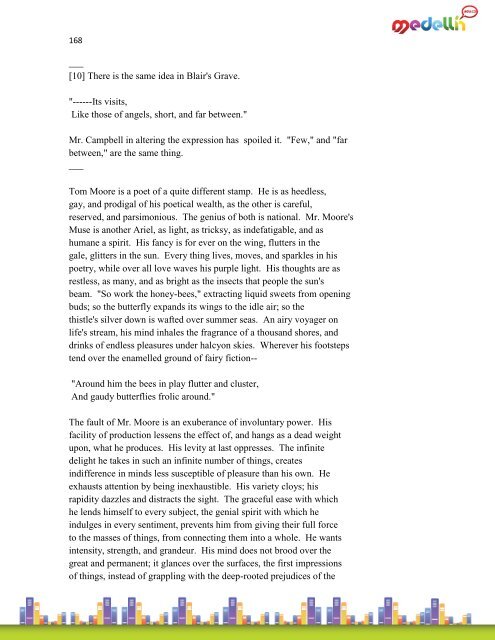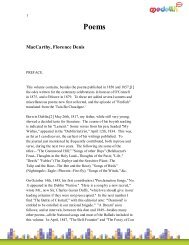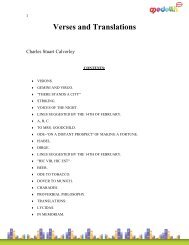Lectures On The English Poets William Hazlitt
Lectures On The English Poets William Hazlitt
Lectures On The English Poets William Hazlitt
Create successful ePaper yourself
Turn your PDF publications into a flip-book with our unique Google optimized e-Paper software.
168<br />
___<br />
[10] <strong>The</strong>re is the same idea in Blair's Grave.<br />
"------Its visits,<br />
Like those of angels, short, and far between."<br />
Mr. Campbell in altering the expression has spoiled it. "Few," and "far<br />
between," are the same thing.<br />
___<br />
Tom Moore is a poet of a quite different stamp. He is as heedless,<br />
gay, and prodigal of his poetical wealth, as the other is careful,<br />
reserved, and parsimonious. <strong>The</strong> genius of both is national. Mr. Moore's<br />
Muse is another Ariel, as light, as tricksy, as indefatigable, and as<br />
humane a spirit. His fancy is for ever on the wing, flutters in the<br />
gale, glitters in the sun. Every thing lives, moves, and sparkles in his<br />
poetry, while over all love waves his purple light. His thoughts are as<br />
restless, as many, and as bright as the insects that people the sun's<br />
beam. "So work the honey-bees," extracting liquid sweets from opening<br />
buds; so the butterfly expands its wings to the idle air; so the<br />
thistle's silver down is wafted over summer seas. An airy voyager on<br />
life's stream, his mind inhales the fragrance of a thousand shores, and<br />
drinks of endless pleasures under halcyon skies. Wherever his footsteps<br />
tend over the enamelled ground of fairy fiction--<br />
"Around him the bees in play flutter and cluster,<br />
And gaudy butterflies frolic around."<br />
<strong>The</strong> fault of Mr. Moore is an exuberance of involuntary power. His<br />
facility of production lessens the effect of, and hangs as a dead weight<br />
upon, what he produces. His levity at last oppresses. <strong>The</strong> infinite<br />
delight he takes in such an infinite number of things, creates<br />
indifference in minds less susceptible of pleasure than his own. He<br />
exhausts attention by being inexhaustible. His variety cloys; his<br />
rapidity dazzles and distracts the sight. <strong>The</strong> graceful ease with which<br />
he lends himself to every subject, the genial spirit with which he<br />
indulges in every sentiment, prevents him from giving their full force<br />
to the masses of things, from connecting them into a whole. He wants<br />
intensity, strength, and grandeur. His mind does not brood over the<br />
great and permanent; it glances over the surfaces, the first impressions<br />
of things, instead of grappling with the deep-rooted prejudices of the

















